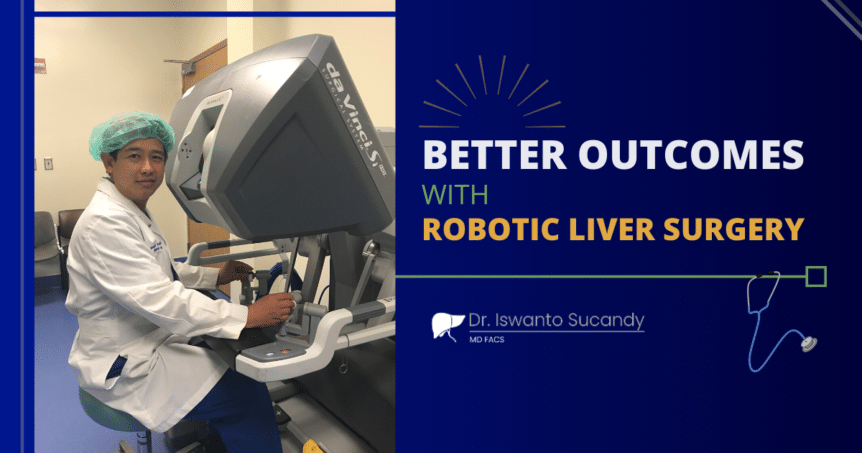
Robotic Liver Resection Is Better Than Laparoscopic Liver Resection For Treatment of Liver Cancer Based on A Recent International Study
Minimally invasive liver surgery has shown proven benefits when compared to the traditional open liver surgery for many types of liver tumors, including by several randomized clinical trials. Advantages such as less pain, lower blood loss, less postoperative complications, shorter hospitalization and earlier return to work are well documented, as long as the patients are suitable candidates for minimally invasive liver surgery technique.
Robotic liver surgery is gaining popularity since it was described approximacalltoy 10 years ago and it is slowly replacing laparoscopic liver surgery in the treatment of liver cancer or liver tumors. Laparoscopic liver surgery is performed using straight instrumentations which is difficult to apply in major liver resections and resections of liver tumors in the deep locations (posterosuperior = deep aspects) of the liver. The robotic system is a computerized method of laparoscopic liver surgery, a “step-up” and more modern technique. The computer technology associated with robotic surgery allows for much more precise dissection of liver tissue, identification and handling of bile duct, suturing of blood vessels, and other delicate tissue manipulations compared to basic laparoscopic surgery. As a consequence, robotic liver resection is associated with much lower chance for emergency open conversion in the middle of the operation, compared to laparoscopic liver surgery. With laparoscopic liver surgery, it is not easy to suture the liver tissue perfectly since the instruments are rigid (not articulated, does not have wristed motion). Consequently, the surgical manipulations are often not as perfect as those in robotic liver resections. This can cause bile leak or delayed bleeding.
As part of international experts of minimally invasive liver surgeons, Dr Sucandy participated in an international multicentre retrospective analysis of patients undergoing robotic versus laparoscopic liver resection for liver tumors in difficult (deep) locations. The study consists of laparoscopic and robotic liver surgery experts from Singapore, China, Korea, Japan, USA, France, Belgium, Netherlands, England and few others. They are pioneers of minimally invasive liver surgery. A total of 340 patients were included and they were matched based on liver tumors size and patients medical conditions (comorbidities). The conclusions were robotic liver surgery is associated with reduced blood loss and lower emergency unplanned ‘open’ conversion rates when compared to the laparoscopic counterparts. The results of the study was published on the very prestigious British Journal of Surgery*
Therefore, in order to achieve best outcomes, it is important to find a best liver surgeon or liver specialist who are well experienced in performing robotic liver surgery since it is associated with better outcomes. Dr Sucandy is an experienced robotic liver surgeon with more than 300 robotic liver resections performed under his belt since 2016. He had performed more robotic liver resections compared to anyone in the United States. Dr Sucandy is a speaker and instructor of robotic liver surgery at many national and international meetings/societies. He is currently proctoring several liver centers to learn how to perform robotic liver surgery to benefit more patients with liver tumors.
*Chiow AKH, Fuks D, Choi GH, Syn N, Sucandy I, Marino MV, Prieto M, Chong CC, Lee JH, Efanov M, Kingham TP, Choi SH, Sutcliffe RP, Troisi RI, Pratschke J, Cheung TT, Wang X, Liu R, D’Hondt M, Chan CY, Tang CN, Han HS, Goh BKP. International multicentre propensity score-matched analysis comparing robotic versus laparoscopic right posterior sectionectomy. Br J Surg. 2021 Nov 9:znab321. doi: 10.1093/bjs/znab321. Epub ahead of print. PMID: 34750608.

